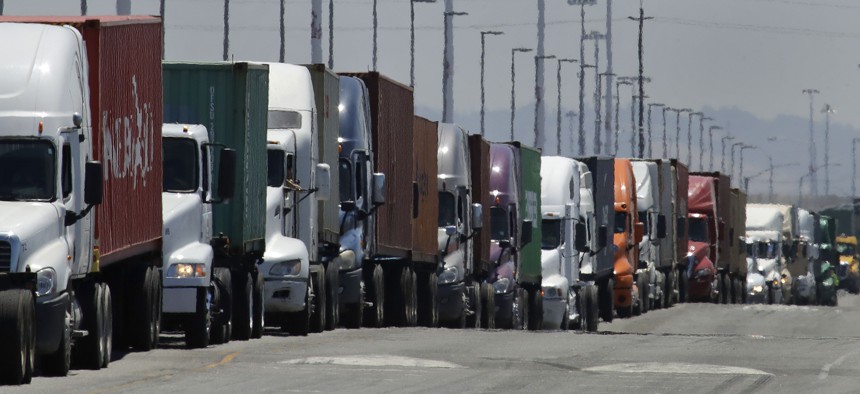Truckers Challenge ‘Gig Worker’ Law With Lawsuit

In this July 22, 2019 photo, trucks hauling shipping containers wait to unload at the Port of Oakland in Oakland, Calif. AP Photo/Ben Margot
They’re arguing that the landmark California legislation, meant to strengthen protections for workers, is preempted by federal law and shouldn’t apply to the trucking industry.
A trucking industry group and two independent truckers moved in federal court this week to challenge a new California law that sets stricter standards for when businesses can classify workers as independent contractors instead of full-fledged employees.
They’re arguing that the “gig worker” statute, and an earlier state supreme court ruling that paved the way for it, are preempted under federal law in such a way that they should not apply to “owner-operator” truck drivers. These independent drivers are common in the trucking industry. They own their own rigs, but go through trucking companies and brokers to get freight.
The complaint filed in court on Tuesday is the latest development in a longer-running legal battle that began last year in the wake of the California Supreme Court decision, which was handed down in Dynamex Operations West, Inc. v. Superior Court of Los Angeles County.
As California lawmakers moved earlier this year toward passing the gig worker bill—Assembly Bill 5—it drew attention for how it would affect tech companies, like Lyft and Uber, that rely on independent contractors to taxi people around and to provide other services.
But the law has implications for a wide range of businesses, including the trucking industry, which fought unsuccessfully to get an owner-operator carve out. People involved in that lobbying effort say they were stymied by unions wielding influence over the legislation.
“AB 5 threatens the livelihood of more than 70,000 independent truckers,” Shawn Yadon, CEO of the California Trucking Association, the group involved in the lawsuit, said in a statement.
“The bill wrongfully restricts their ability to provide services as owner-operators and, therefore, runs afoul of federal law,” he added.
Assemblywoman Lorena Gonzalez, who authored AB 5, indicated in a statement that the court challenge did not come as a total surprise to her. “Big trucking conglomerates sued under Dynamex, so it makes sense they would sue about AB 5,” she said.
“We expect big corporate interests—especially those who have misclassified their workers for years—to take this fight back to the place they know they can delay justice for workers: the courts,” Gonzalez added.
It would be a stretch to describe all of the truckers opposed to AB 5 as “big corporate interests.”
Some, as Route Fifty has reported, are drivers who have invested in trucks that can cost hundreds of thousands of dollars, and who say that the law will upend a business model that they’re content with, and that they planned to rely on to earn a living and pay off loans.
That said, even some people within the industry, who oppose the law as it’s written, acknowledge that there were businesses that were misclassifying truck drivers as independent contractors. This is especially a problem at California’s major ports, they say.
The sparring over California’s law comes as interest brews among labor advocates and some lawmakers in New York, another big, Democratic-leaning state, in pursuing similar measures.
Gov. Andrew Cuomo has signaled that he may be open to legislation along these lines. “I think we have to look at how we define 'employee' versus 'independent contractor' going forward, and I think, in my opinion—forget the specifics—more people should be considered employees,” Cuomo said during a press conference in September, according to Crain’s New York Business.
To guide worker classification decisions, Assembly Bill 5 codifies a three-part “ABC test,” that was put forward in the Dynamex ruling. Under that test, a worker can be hired as a contractor if their employer can establish the person meets each of the test’s three criteria.
If a worker fails to meet those requirements, and doesn’t qualify for an exemption under the law, they’d need to be treated as a regular employee.
Classifying workers as full-fledged employees, rather than contractors, puts companies in a position where they have to foot the bill for additional costs, like payroll taxes, health benefits, and workers compensation insurance to cover employees injured on the job.
The part of the ABC test that presents a sticking point for owner-operator truck drivers, and the companies they go through to get loads, says that to qualify as an independent contractor, a person's work must be outside “the usual course” of the employer’s line of business.
In this case, that’s likely a violation of the test as truckers and trucking companies are doing the same sort of work.
The lawsuit seeks to block the law and the Dynamex ruling from applying to truckers on the grounds that it is preempted by a 1994 federal law restricting state regulations on trucking. The suit claims that AB 5 violates the U.S. Constitution’s Commerce Clause as well.
It also contends that meal and break period standards under the law would conflict with federal “hours-of-service” rules for truck drivers.
This week’s court complaint is the latest step in a case that began last October, with the California Trucking Association and the drivers challenging the Dynamex precedent. The case is playing out in a U.S. District Court in San Diego.
Truckers aren’t the only ones chafing over AB 5. People in other professions not covered by exemptions written into the legislation have voiced concerns as well—independent musicians, freelance writers and photographers and physical therapists to name a few.
Meanwhile, app-based ride-booking companies Uber and Lyft, along with DoorDash, a tech company offering delivery services, are floating a ballot measure aimed at getting their drivers and couriers exempted from the law. The companies have pledged a combined $90 million toward that initiative.
Bill Lucia is a Senior Reporter for Route Fifty and is based in Olympia, Washington.
NEXT STORY: Using Social Media to Monitor Endangered Species Uncovers Surprising Information






